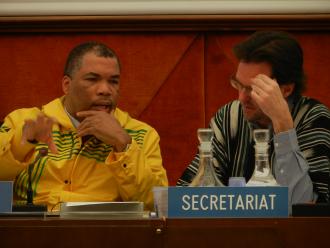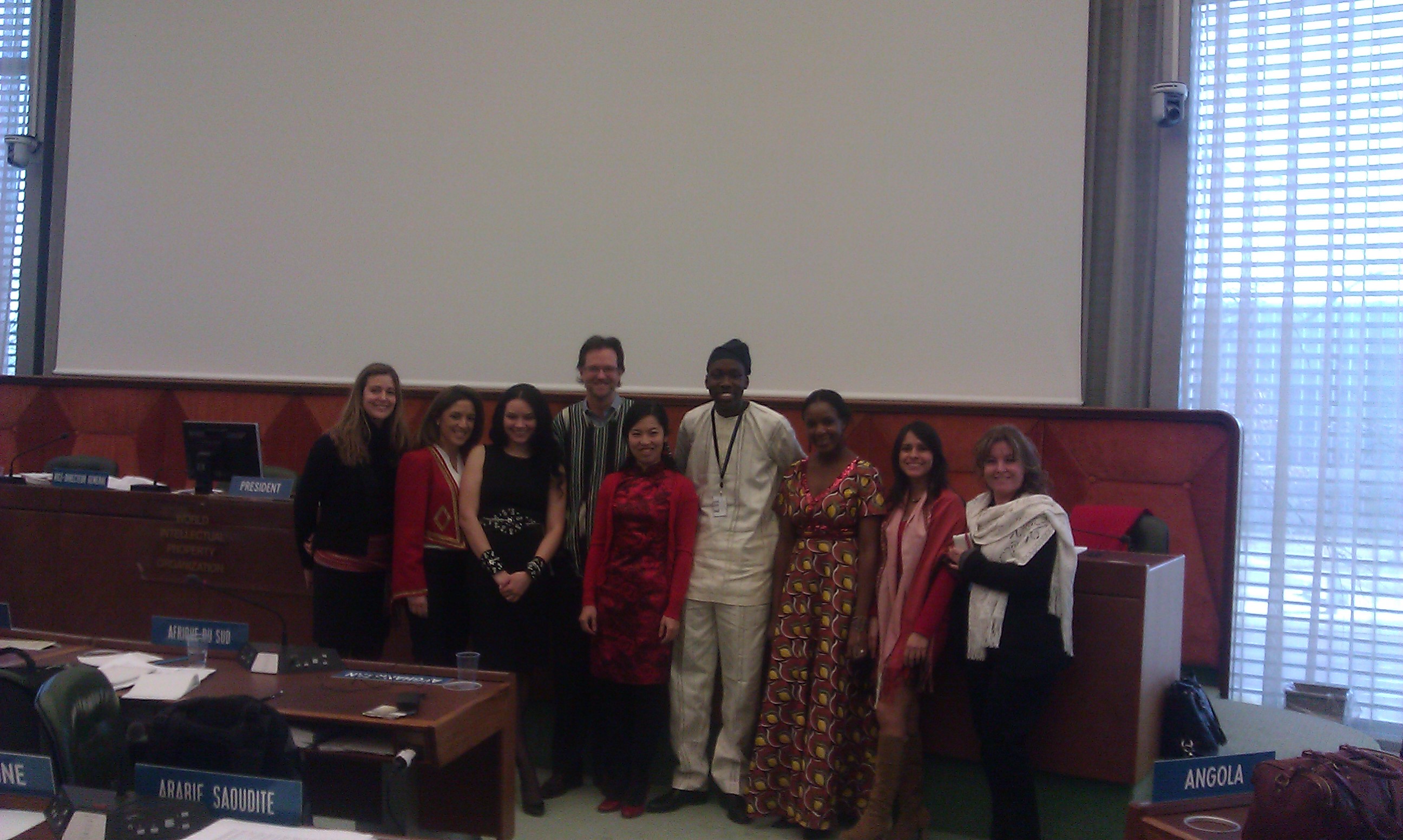18 January 2012

|
| Chair of IGC 20, Ambassador Wayne McCook, Jamaica, and Wend Wendland, WIPO Courtesy of Marc Perlman |
Saturday’s session witnessed many delegates to WIPO’s 20th session (14 February 2012 to 22 February 2012) of the Intergovernmental Committee on Intellectual Property and Genetic Resources, Traditional Knowledge and Folklore (IGC/GRTKF) attired in national dress with the Chair, Ambassador Wayne McCook (Jamaica), sporting an athletic jersey, Dominic Keating (Director, Intellectual Property Attaché Program, United States Patent and Trademark Office) wearing a baseball cap (turned backwards) and and your blogger sporting a Sri Lankan cricket jersey (2011 Cricket World Cup training jersey). The casual sartorial garb encouraged by the Chair should not be perceived as let up in the intensity of WIPO negotiations on an international legal instrument for the protection of genetic resources.
Please click on the following links to see the delegates negotiate in their sartorial splendor.
http://www.wipo.int/meetings/en/webcasting/portal/includes/live.jsp
http://www.wipo.int/meetings/en/webcasting/portal/includes/live_floor.jsp
The focus of Saturday’s discussion was the text on “options for implementation of objectives and principles” which included a section on “Scope of Protection” of an international legal instrument.
The first part of this section, Option 1(a) included language on a mandatory disclosure requirement (including country of origin and source of genetic resources) and a provision on prior informed consent. Option 1 was generally the preferred text of developing country demandeurs of an international legal instrument for the protection of genetic resources.
Option 1(d) states:
“No intellectual property rights shall be granted to genetic resources that naturally occur in situ and ex situ.”
and Option 1(e) states:
That the national intellectual property offices shall:(i) Consider all relevant written and oral information relating to genetic resources, their derivatives and associated traditional knowledge, regardless of the language, from all countries when conducting search and examination for determining the eligibility criteria for granting of intellectual property rights.
(ii) Develop appropriate and adequate guidelines for the purpose of conducting search and examination of intellectual property applications relating to genetic resource[sic], their derivatives and associated derivatives and associated traditional knowledge considering existing and additional information provided by the applicants, as well as accessible to the examiners.
Contracting Parties shall appoint national intellectual property offices as a checkpoint for disclosure of the country of origin and source of genetic resources, their derivatives and associated traditional knowledge and for their monitoring.
To undergird their text in the objectives and principles section (Option 2 of Objective 2) to ensure no patents on life and life forms are granted for genetic resources and associated traditional knowledge, Bolivia requested the insertion of a new romanito (iii) under Option 1 (e):
Ensure that IP offices shall not grant patents on life forms, or parts thereof in the form of biological or genetic resources as they are found in nature, that are only isolated or characterized as such, as well as their derivatives and associated traditional knowledge.
This Bolivian text was supported by Venezuela, the African Group and Sri Lanka.
In response to Bolivia, the United States proposed the following alternative language:
Enhance the availability of patent protection for life forms and new uses for known substances in order to create benefits and support benefit sharing from the use of genetic resources and associated traditional knowledge.
As the plenary closed before lunch, only two sections remained to be discussed in the afternoon session, 1) Sanctions, Remedies and Exercise of Rights and 2) Technical Assistance Cooperation and Capacity Building. During the morning session, Ambassador McCook likened the process of IGC 20 to sausage making. From this vantage point, an international legal instrument for the protection of genetic resources seems like a long slog ahead.
17 February 2012
Currently, the 20th session of the World Intellectual Property Organization’s Intergovernmental Committee on Intellectual Property and Genetic Resources, Traditional Knowledge and Folklore (IGC/GRTKF) is deliberating over draft objectives and principles relating to intellectual property and genetic resources (WIPO/GRTKF/IC/20/4). These discussions are guided by the mandate of the Thirty-Eighth Session of the WIPO General Assembly (2009) which instructed the Committee to
continue its work and undertake text-based negotiations with the objective of reaching agreement on a text of an international legal instrument (or instruments) which will ensure the effective protection of GRs, TK and TCEs.
It is understood that the draft objectives and principles relating to intellectual property and genetic resources would serve as the basis for an international legal instrument on the protection of genetic resources.
Three facilitators, Ian Goss (Australia), Chandni Raina (India) and Tom Suchanandan (South Africa) were selected to prepare a “Facilitators’ Consolidated Document Relating to Intellectual Property and Genetic Resources”. The 2nd version of this document was released on 16 February 2012 at 17:38 Central European Time. This document reproduce the contents of documents, WIPO/GRTKF/IC/20/4 (Draft Objectives and Principles Relating to Intellectual Property and Genetic Resources, prepared by the WIPO secretariat), WIPO/GRTKF/IC/19/6 (Draft Objectives and Principles Relating to Intellectual Property and Genetic Resources, prepared by the WIPO secretariat), the African Group proposal, the Like-Minded Countries proposal, in addition to interventions made in plenary at IGC 19.
Option 2 of Objective 2 is based on text originally introduced by Bolivia at WIPO’s Third Intersessional Working Group (which met from 28 February 2011 to 4 March 2011 focusing on genetic resources) to ensure no patents on life and life forms are granted for genetic resources and associated traditional knowledge.
Option 2Ensure that no patents on life and life forms are granted for genetic resources and associated traditional knowledge.
Today, this provision was supported by Venezuela, the Holy See, Algeria, Egypt and India. The Republic of Korea, Japan, Switzerland, the European Union, and United States requested that this provision be bracketed. Korea, Switzerland and the EU specifically requested that the Bolivian text be deleted.
The US provided a more nuanced intervention in comparison to the blunt demands of Korea, Switzerland and the EU:
We propose a new option 2: “Enhance the availability of patent protection for life forms and new uses for known substances in order to create benefits and support benefit-sharing from the use of genetic resources and associated traditional knowledge.” The intention is not to promote the protection of substances in nature but to protect new useful non-obvious inventions. We haven’t been adding our delegation to the list of those requesting that brackets remain, but we support retaining the brackets advocated by Japan, EU, Canada.
